Meet the 2024 Lost Trails Found paid crews
WTA's Lost Trails Found paid crews have a big summer of trail work planned. Meet some of the maintainers doing this tough work and learn what they're looking forward to in 2024. By Joseph Gonzalez
Many backcountry trails throughout Washington are at risk of disappearing entirely. Natural disasters, lack of maintenance and funding and other factors pose existential threats to trails that bring hikers to spectacular, remote places. That’s where WTA’s paid Lost Trails Found (LTF) crews come in. Now in its fourth season, the LTF crews are looking forward to their biggest summer yet.
Offering paid crews of professional trail workers helps alleviate pressure on our land manager partners who don’t always have the budget or bandwidth to activate their own. These teams of six professional trail maintainers each can take on technical and potentially hazardous projects that just aren’t the right fit for our volunteer backcountry response teams (BCRTs).
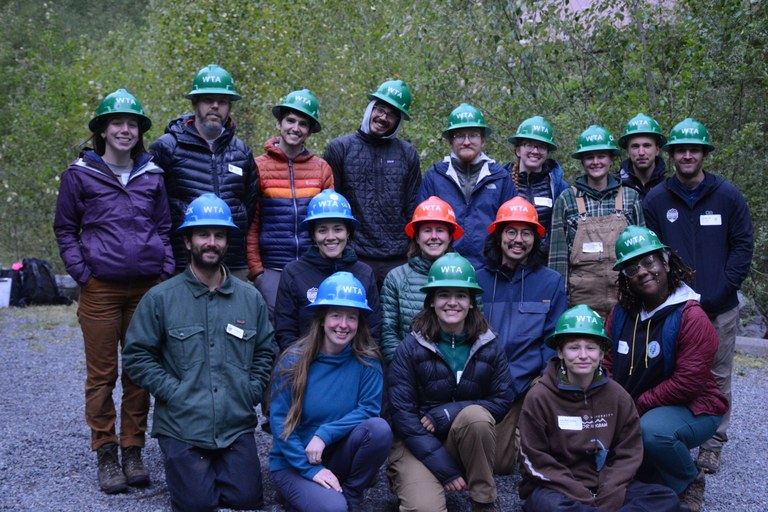
Paid LTF crews recently brushed up on their trail skills at Crew Leader College, WTA's annual gathering of trail maintainers. Photo by Anna Roth
We’re excited to share some exciting changes taking place in our 2024 backcountry season:
- We're bringing a third paid crew to Washington trails. That’s some serious year over year growth (we began the program in 2021 with just one paid crew).
- LTF continues to provide professional development opportunities for folks pursuing careers in the outdoor field. Several former crew members have moved into new roles as assistant crew leaders, and a few assistant crew leaders are now crew leaders.
- In addition to working on federal land in areas decimated by wildfires, crews this year will be partnering with Washington Department of Natural Resources to provide support in key recreation areas.
Backpack packed, boots tied and hard hat on? Great! We sat down with a few crew members to hear what they’re most looking forward to this season:
Michelle (she/they) - Lost Trails Found crew leader
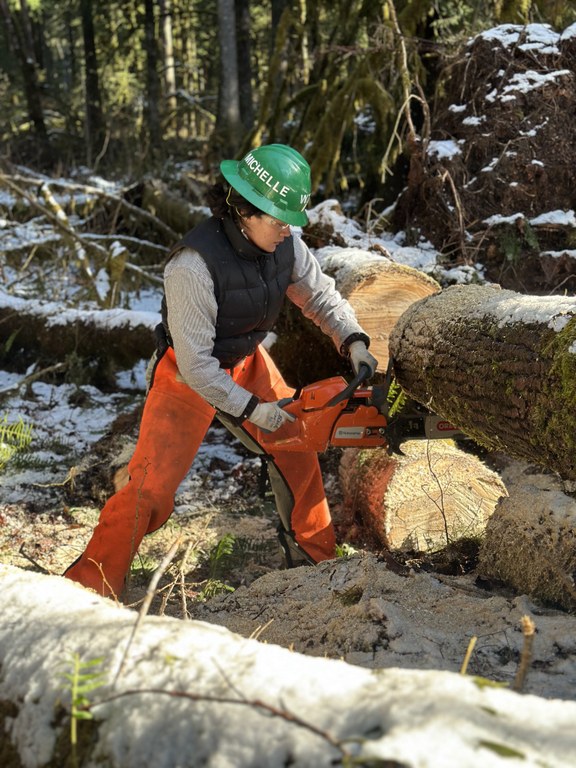
Michelle's eager to transition from crew leading the Emerging Leaders Program to crew leading a Lost Trails Found crew this summer. Photo by Michelle Mouw
How long have you been doing trail work?
This is my third year of trail work. My first year of trail work was in 2022 with the Southwest Conservation Corps.
Can you speak a bit more to your pathway of becoming an LTF crew leader?
I was introduced to WTA through the Emerging Leaders Program (ELP), which is a BIPOC trail crew and developmental program. After doing trail work in Southwest Colorado, I was very much isolated from any Asian community specifically (I’m half Chinese) and I was seeking not just BIPOC community, but BIPOC community in outdoor work. I didn’t think it was possible or existed, but then I found exactly that in the Emerging Leaders Program! And while I was an ELP crew member last year, this year I took on the role of ELP crew leader.
How is your role as a Lost Trails Found crew leader similar or different to crew-leading for the Emerging Leaders Program cohort?
It’s different because LTF is backcountry work, but ELP is frontcountry oriented. Being on a hitch schedule where you’re gone for seven days at a time is vastly different from day work parties. You’re spending way more time in more prolonged, stressful situations. But also, you’re working in beautiful places as well. The stakes are a bit higher.
ELP is a developmental program, whereas LTF is more production-oriented. Part of the ELP curriculum is meeting community partners and doing independent projects where cohort members interface with office and admin staff. LTF is almost purely trail work.
What’s a skill you’ve recently picked up that you’re looking forward to implementing this season?
I’ve learned so much from Angelic (Emerging Leaders Program coordinator) on how to manage trail work on the fly and in the moment. That’s a skill I want to practice getting better at. There’s so much nuance to being able to plan out what a crew will be working on day-to-day, let alone over a six or seven day hitch.
What’s your favorite meal to eat as soon as you get home from a long hitch on trail?
Pho. Anything with broth and noodles!
Daisy (she/her) - Lost Trails Found Assistant Crew Leader

Daisy's got a keen perspective on navigating the work-life balance of a seasonal role. Photo by Kyvan Elep
How long have you been doing trail work?
This is my second year doing trail work with WTA. Before that, I did a little bit with an AmeriCorps crew also based out of Seattle. So, about three years.
Last year, you were a crew member and this year you’re an assistant crew leader. How will this season be different in your new role?
I'm looking forward to doing more strategy work this season, like scouting or forward planning for projects. I was already confident in being a crew leader in restoration work, and I’m interested in filling more leadership roles in the industry as I continue to apply similar skills in trail maintenance.
Now that I know what to expect from a typical hitch, I am excited to think beyond the day-to-day. Crew members certainly aren’t passive, but sometimes it’s easy to tune-out some of the smaller things and to defer to the crew leader. So, stepping into a role that requires a bit more attention and leadership is a way for me to solidify some of these strategy skills.
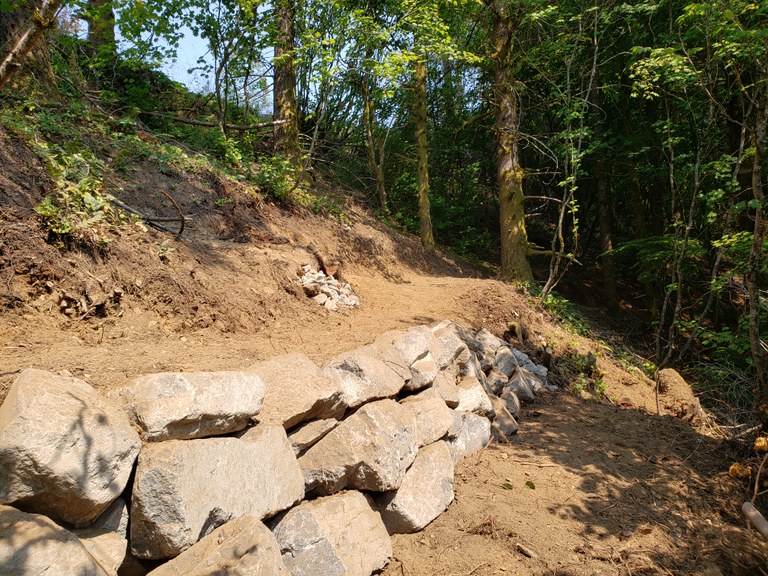
Some projects call for saws and other projects call for rock work. Each trail has its own needs. Photo by Greg Jackson
What’s a skill you’ve recently picked up that you’re looking forward to implementing this season?
This is a unique job: you live and work with your coworkers, and you’re on six-person crews with them all summer. Striking a healthy work-life balance is a skill I’ve been developing for a long time, but more recently I’ve been rethinking how I envision that type of balance. Sometimes I get socially burned-out on a hitch. So not feeling any shame about taking time to just be by myself is totally ok.
What’s your favorite meal to eat as soon as you get home from a long hitch on trail?
On my last hitch, I came home and my partner had made me a really nice pasta dinner. He set the gold standard.
But otherwise, whatever I can eat that’s easy and has a lot of salt! I love salt and I love spice, so my go-to is usually Thai food or a burrito.
Zenwa (he/him) - Lost Trails Found Assistant Crew Leader

Zenwa's taking years of trail maintenance experience into his role of assistant crew leader this season. Photo by Savanna Lopez
How long have you been doing trail work?
This is my fourth season, so about three years. I have been on an LTF crew the last two summers, and the winter before that I was with the Emerging Leaders Program.
What makes you want to do trail work right now as a professional career path?
I enjoy working outdoors. Something about being outside is refreshing and keeps my energy up. Also, when I got my start in trail work as a part of ELP, I was working with other BIPOC trail crew workers and leaders. Zachary Toliver (former WTA South Puget Sound trail coordinator) was someone I really looked up to at that time. I saw him doing trail work and building community and thought to myself, “I can do this!”
You’ve transitioned from a crew member to an assistant crew leader. How do you expect things to be a bit different in your new role?
I’m stepping up to take a more formal responsibility for the crew, as well as to mentor some of the crew members who have a little less experience. I’ve always tried to do those things as a crew member, but it’s nice to be in a more formal role where there are those expectations of me.
What’s your favorite meal to eat as soon as you get home from a long hitch on trail?
On the drive home from a hitch I love to stop at a diner or grab a burger. Always a cheeseburger with curly fries if they have them (curlies are ideal), or sometimes tater tots.
Bailie (she/her) - Lost Trails Found Crew Member
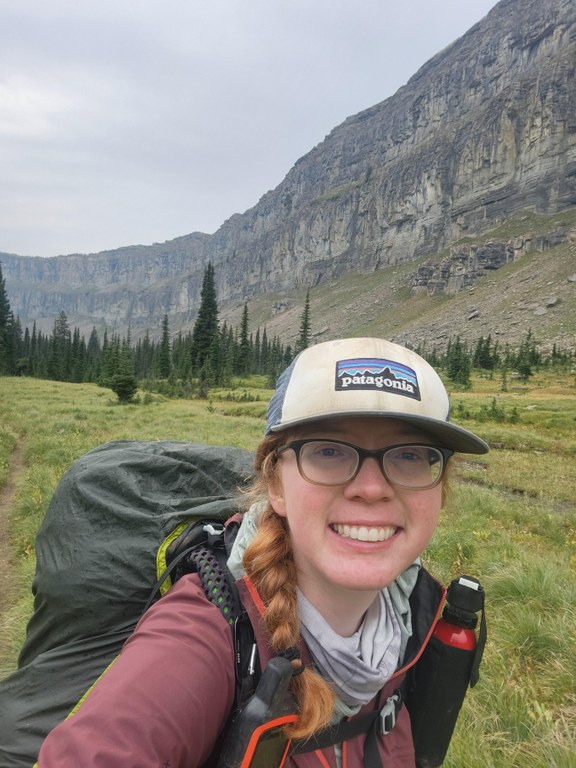
Bailie hiked the CDT in 2022 before leaning into trail work. Photo by Bailie Bechtel
How long have you been doing trail work?
I started doing trail work with WTA as a volunteer in 2021. Overall about three years, on and off on the weekends, before I became an LTF crew member.
What made you want to get involved with trail work?
I hiked the Pacific Crest Trail (PCT) (trail name: Mouse) before I got my first “adult” job as an accountant. But I felt a little cramped at the office job. I enjoyed it, but wanted to spend more time outside. So, in 2022 I hiked the Continental Divide Trail to get more time outside and think things through. Because I was on a trail that was not complete yet and still needs a lot of help, I kept thinking “what do I want to do with my life?” Trail maintenance was right in front of me, literally. Back at my job as a corporate accountant I could see Tiger Mountain from my office window. I’d look out at the mountain, wishing I was out there, knowing there are WTA crews on trail doing maintenance. One day I just got the courage to try it myself and join a work party.
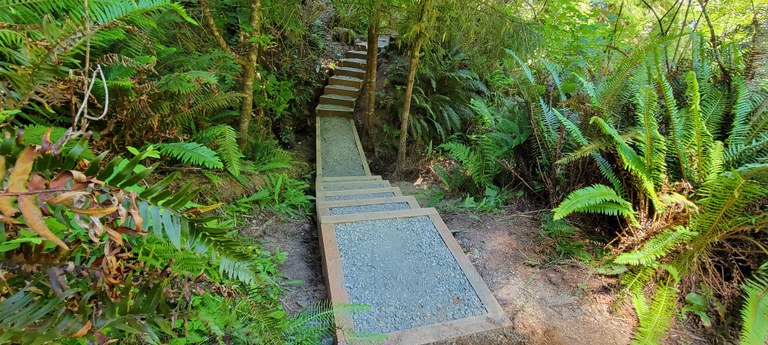
Box steps can be an involved process, but are quite satisfying once complete. Photo by James Alexander
What’s a skill you’ve recently picked up that you’re looking forward to implementing this season?
I learned how to make box steps recently at a volunteer work party where I worked with a volunteer 1:1 the whole time. It was very satisfying. George (assistant crew leader) showed me the ropes.
Also, I’ve never done seasonal work and [seasonal] living. I was an accountant who loves stability. So I’m trying to embrace the seasonal work life and not knowing what I might be doing come October. But I’m also excited, because that means there are more options, and I won’t be doing the same thing I was always doing before. Maybe I’ll be bookkeeping over the winter, or maybe I’ll be working in a coffee shop!
What’s your favorite meal to eat as soon as you get home from a long hitch on trail?
I really like a good crispy chicken sandwich with pickles on it. And onion rings on the side. If onion rings are on the menu, I will 100% get them every time.
Joey (they/he) - Lost Trails Found Crew Member
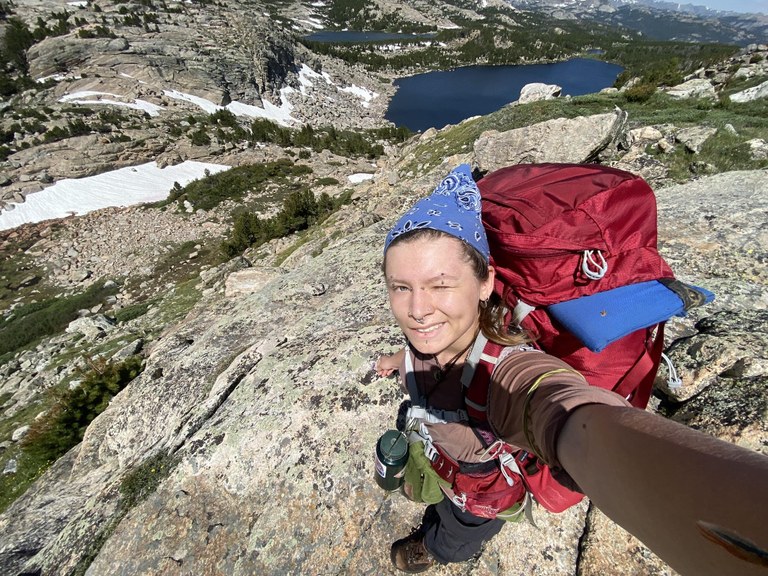
Joey's brings years of trail maintenance experience in their first year with LTF. Photo by Joey McKrola-Dey
How long have you been doing trail work?
Since I was 15, so around five years. I started on a youth crew with Northwest Youth Corps, and I’ve been doing that every summer while I was in high school up through university. My parents were both trail workers, so I got introduced early.
What makes you want to do trail work right now as a professional career path?
I love being outside and tending to the land. Especially with topics like climate change, I relish putting effort into making the outdoors accessible. It’s important to see where trails are now so you can know how far they’ve come in the future. There aren’t many opportunities where you get paid to camp for weeks on end. That’s special.
Plus, I love being properly compensated for my work, so doing it professionally and having all the benefits that WTA provides is awesome. Especially being pretty young, opportunities like this are formative.
What’s a skill you’ve recently picked up that you’re looking forward to implementing this season?
Although I’m not a crew leader or assistant crew leader, I think it’s important for each crew member to be self-sufficient in a well oiled crew. I’ve been doing this for a long time and feel like I have a handle on it, so I’m trying to bring some peer leadership and kind advice towards teammates. Leaning into the social aspect is something I’m excited about.
What’s your favorite meal to eat as soon as you get home from a long hitch on trail?
I’m always craving some sort of ice cream or popsicle. Something fresh and perishable that you can’t take into the backcountry.
Hugo (he/him) - Lost Trails Found Crew Member

Hugo's 2024 trail maintenance ambitions are a manifestation of both his recreational and educational interests. Photo by Hugo Vasconcelos
How long have you been doing trail work?
Not long. Before this, I joined four volunteer opportunities in Southwest Washington with WTA. I also did one weekend of volunteering with the Pacific Crest Trail Association building a turnpike near White Pass.
What makes you want to do trail work right now as a professional career path?
I just finished my major in Environmental Science with Washington State University. As much as it’s a major geared toward the outdoors, you don’t actually get to spend much time outside. So, after four years of education, I was really just craving being more in contact with nature.
Also, I hiked the PCT in 2018, so I’m quite geared toward trail culture. Trail maintenance merges both words. Like, “hey, I can actually get paid to do something I’d want to do on my own time for free.” It’s very cool.
As I was hiking, I was putting pieces together like, “how is this actually made?” It would be interesting to bring some of these trail resources and experiences to my home country of Portugal and start interacting with the hiking community there.
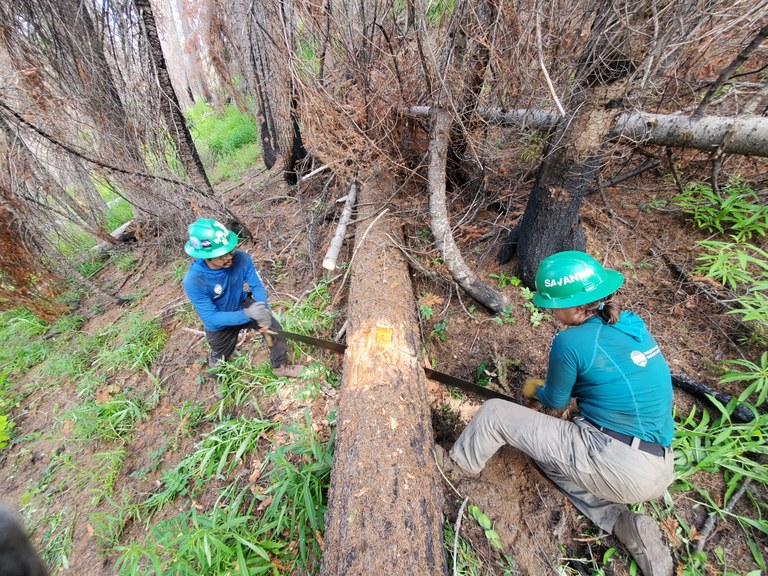
The crosscut saw is a powerful tool in a sawyer's arsenal. Photo by Zack Sklar
What’s a skill you’ve recently picked up that you’re looking forward to implementing this season?
I’ve lived with my partner since I met her on the PCT in 2018. We were constantly together almost 24 hours every day, then we had the pandemic and were stuck inside for a long time. Figuring out that work-life balance will be important. I’ll be looking to learn how the rest of the crews — especially the returners — handle being apart from their partners for maybe seven days at a time and how I can do the same.
What’s your favorite meal to eat as soon as you get home from a long hitch on trail?
A homemade vegan crunchwrap supreme. It’s impossible to do on trail. It hits so, so good.
We’re grateful for our many land manager partners who make it possible for us to tackle these tough projects, one backcountry trail at a time. So, next time you visit a backcountry trail in need of love, consider the hard working individuals, like our LTF professional crews and BCRT volunteers, who make access to these places possible. Or, go a step further and join us on a volunteer vacation or BCRT! Happy trails.


Comments